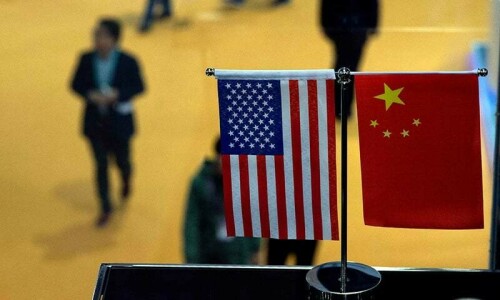ISLAMABAD: Pakistan will not allow commercialisation of the genetically modified (GM) crops in the country without a proper research and regulatory mechanism to ensure the safety of the citizens.
This was stated by Minister for Climate Change Mushahidullah Khan while talking to Dawn on Monday.
“It is part of my faith that the genetically modified food and pesticides used on them are the major causes of diseases such as cancer and other health problems, including low fertility in males.”
Mr Khan’s statement coincided with the International Health Day being commemorated on April 7. This year, the World Health Organisation (WHO) is highlighting the challenges and opportunities associated with food safety under the slogan “From farm to plate, make food safe.”
The minister’s comments also came ahead of the report in which the WHO raised new concerns about the use of roundup herbicides on the GMO crops. In its report, the WHO declared that the world’s most widely used glyphosate in roundup herbicides to kill weeds “probably” caused cancer.
Mushahidullah Khan says govt will never allow commercialisation of GM crops without proper research and regulatory mechanism
The WHO said in its report that roundup’s active ingredient glyphosate that killed all major weeds except the crop that contained the modified gene was identified as carcinogenic.
“While selling GMOs in developing countries is a matter of business for multinational GM seed producing companies, its unregulated usage is a matter of life and death and can impact Pakistan’s food security,” said the minister.
According to a senior agriculture scientist at the Pakistan Agriculture Research Council (PARC), countries such as Sri Lanka have banned the herbicide after more than 20,000 deaths from kidney failures were linked to it. Brazil and El Salvador have also banned the roundup spray.
Multinational GM seed and pesticide-producing companies have been seeking approval from the government to allow trial and eventually commercialisation of the GM corn in Pakistan. They have been conducting trials of GM corn in Khyber Pakhtunkhwa and some areas of Punjab since 2009.
“The government has not permitted new trials after devolution in 2010 and after the National Bio-safety Council, which monitors and regulates GMO crops in Pakistan, ceased to exist after the devolution,” said Director General Pakistan Environment Protection Agency (Pak-EPA) Dr Mohammad Khurshid.
“We are not against new technologies but without rules and regulations to monitor them, GMO crops are like biological weapons of mass destruction in the wrong hands,” said Dr Khurshid.
Describing it as a credible source of information, he said his office would use the WHO report to amend laws to regulate GMOs.
Saying that the authority treated GMOs ‘very seriously’, Dr Khurshid said, “The Foreign Office has also conveyed its concern to the Ministry of Climate Change that the subject of GMO seeds is a matter of concerns for national security and trade.”
Former director general EPA Asif Shuja explained that Pakistan was a signatory to the Cartagena Protocol which stated that the trials of genetically modified organisms must be conducted by departments with expertise in the field.
“Unfortunately, Pakistan has none,” he said, explaining why the KP government rejected a seed bill last year to allow commercialisation of GM corn until the province developed expertise on the subject.
Chairman Agri-Farms Pakistan Dr Ibrahim Mughal reiterated his stance that Pakistan was at risk with GMO crops, so was its sovereignty.
However, the multinational company, Monsanto, which has been promoting GM agriculture in Pakistan since 1998 and markets roundup, contested the WHO report.
Its head in Pakistan, Amir M. Mirza, maintained that the herbicide was one of the safety sprays. “Its usage is thoroughly regulated. We are contesting the report because the WHO did not take sufficient data into account.”
Published in Dawn April 7th, 2015
On a mobile phone? Get the Dawn Mobile App: Apple Store | Google Play













































